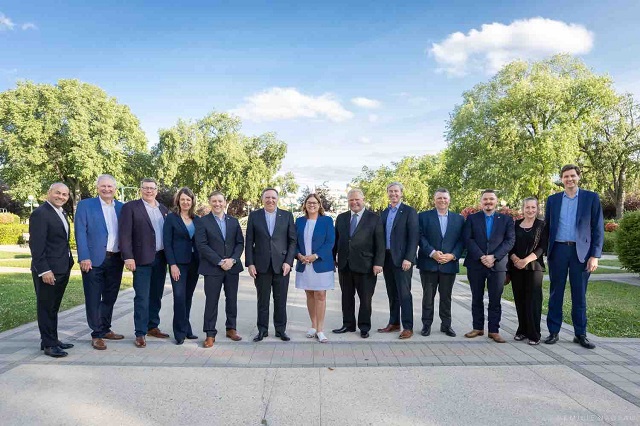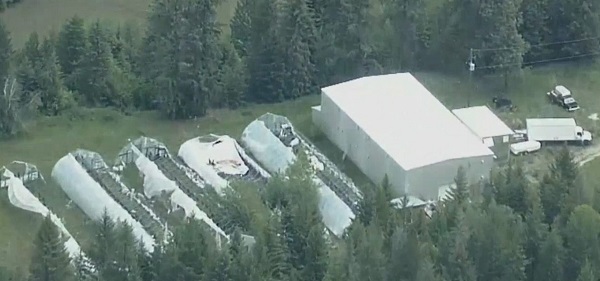Alberta
Canada’s Premiers beginning to back Canadian energy

News release from Project Confederation
Alberta Premier Danielle Smith was on a mission last week and had three things on her mind: energy, energy, energy.
The interesting thing is, many of the other provinces now seem to be on the same page too.
Energy is a policy area that has always been a flashpoint for trouble for the federal government and we’ve seen an ever-increasing number of disputes developing in recent years, deteriorating interprovincial relations and creating constitutional struggles.
The most recent argument started last Friday when Premier Smith met with Prime Minister Justin Trudeau in Calgary to talk about – you guessed it! – energy policy.
Trudeau has announced several ambitious climate policies that will drive energy costs up.
These include aggressive net-zero emissions electricity targets that are going to make power at least 40% more expensive, cost $52 billion for infrastructure alone, and another $35 billion in economic activity.
They’ve also announced an emissions cap on the oil and gas sector in western Canada – which is effectively a production cap, limiting the ability of producers to up their production in order to meet rising global demand.
Smith isn’t going along with these destructive policies.
Natural resource development is the sole jurisdiction of the provinces, not the federal government, and Smith says that Alberta will not be a doormat for federal climate policies that are going to decimate its economy.
She made it clear she will do whatever is necessary to protect Alberta’s interests.
After this bout with Trudeau, she headed out to Winnipeg for the 2023 Summer Meeting of Canada’s Premiers.
Once again, Smith hammered on Ottawa’s aggressive targets and the impact they will have on the economies of the federation – not just Alberta.
Next, she headed to the LNG2023 Conference in Vancouver, looking to establish new export markets for Alberta’s Liquefied Natural Gas (LNG) – a major source of tension between the federal government and the provinces.
Smith pointed out that Western Canada wants the ability to export LNG to fulfill rising global demand, a resource that Canada has in abundance:
“With the right infrastructure in place, Western Canada would become a sought-after supplier for both Asia and Europe.”
Notably, federal Natural Resources Minister Jonathan Wilkinson didn’t even show up to the conference, instead sending Tourism Minister Randy Boissonnault.
Perhaps most importantly though, Alberta no longer stands alone.
The federal government has intruded so much into provincial jurisdiction on so many issues, that more and more provinces are pushing back.
At the start of her trip, Smith predicted that she would have a few allies.
“I can tell you the thing that has surprised me the most is that it doesn’t matter what political stripe the premiers have, every single one of them is frustrated with federal interference into their business,” she said.
She was right.
The Council of Premiers made it clear that they weren’t happy being force-fed aggressive deadlines that were going to decimate the Canadian economy.
Scott Moe, Premier of Saskatchewan, publicly called out the Prime Minister and Steven Guilbeault, federal Minister of Environment and Climate Change, tweeting:
“If it wasn’t clear before, it is now. The Trudeau government doesn’t want to just reduce emissions in our energy sector, they want to completely shut down our energy sector.”
Blaine Higgs, the Premier of New Brunswick added:
“It just seems to be a pile-on of additional costs, Let’s get some recognition for the impact this is having on everyday lives.”
Even David Eby’s NDP government in British Columbia is joining in and are looking at ways to grow LNG exports with the recent establishment of a task force with a mandate to explore export expansion opportunities.
If there is one thing that this past week and a half did demonstrate is that when it comes to energy, the provinces have never been more united against a federal government that continues to overstep its jurisdictional boundaries.
This level of agreement amongst premiers is a major step forward, and it demonstrates that common ground can be found between provinces when it comes to federal overreach.
It is also important because it demonstrates that the rest of the country is getting fed up with the never-ending climate brigade taking shot after shot after shot at the energy industry without addressing the impact energy has on affordability.
Some time ago, we launched a campaign to Stand Up for Alberta Energy.
If you agree with our work in this area, and want to get more involved with the campaign, please join the campaign here:
Alberta
Alberta’s grand bargain with Canada includes a new pipeline to Prince Rupert

From Resource Now
Alberta renews call for West Coast oil pipeline amid shifting federal, geopolitical dynamics.
Just six months ago, talk of resurrecting some version of the Northern Gateway pipeline would have been unthinkable. But with the election of Donald Trump in the U.S. and Mark Carney in Canada, it’s now thinkable.
In fact, Alberta Premier Danielle Smith seems to be making Northern Gateway 2.0 a top priority and a condition for Alberta staying within the Canadian confederation and supporting Mark Carney’s vision of making Canada an Energy superpower. Thanks to Donald Trump threatening Canadian sovereignty and its economy, there has been a noticeable zeitgeist shift in Canada. There is growing support for the idea of leveraging Canada’s natural resources and diversifying export markets to make it less vulnerable to an unpredictable southern neighbour.
“I think the world has changed dramatically since Donald Trump got elected in November,” Smith said at a keynote address Wednesday at the Global Energy Show Canada in Calgary. “I think that’s changed the national conversation.” Smith said she has been encouraged by the tack Carney has taken since being elected Prime Minister, and hopes to see real action from Ottawa in the coming months to address what Smith said is serious encumbrances to Alberta’s oil sector, including Bill C-69, an oil and gas emissions cap and a West Coast tanker oil ban. “I’m going to give him some time to work with us and I’m going to be optimistic,” Smith said. Removing the West Coast moratorium on oil tankers would be the first step needed to building a new oil pipeline line from Alberta to Prince Rupert. “We cannot build a pipeline to the west coast if there is a tanker ban,” Smith said. The next step would be getting First Nations on board. “Indigenous peoples have been shut out of the energy economy for generations, and we are now putting them at the heart of it,” Smith said.
Alberta currently produces about 4.3 million barrels of oil per day. Had the Northern Gateway, Keystone XL and Energy East pipelines been built, Alberta could now be producing and exporting an additional 2.5 million barrels of oil per day. The original Northern Gateway Pipeline — killed outright by the Justin Trudeau government — would have terminated in Kitimat. Smith is now talking about a pipeline that would terminate in Prince Rupert. This may obviate some of the concerns that Kitimat posed with oil tankers negotiating Douglas Channel, and their potential impacts on the marine environment.
One of the biggest hurdles to a pipeline to Prince Rupert may be B.C. Premier David Eby. The B.C. NDP government has a history of opposing oil pipelines with tooth and nail. Asked in a fireside chat by Peter Mansbridge how she would get around the B.C. problem, Smith confidently said: “I’ll convince David Eby.”
“I’m sensitive to the issues that were raised before,” she added. One of those concerns was emissions. But the Alberta government and oil industry has struck a grand bargain with Ottawa: pipelines for emissions abatement through carbon capture and storage.
The industry and government propose multi-billion investments in CCUS. The Pathways Alliance project alone represents an investment of $10 to $20 billion. Smith noted that there is no economic value in pumping CO2 underground. It only becomes economically viable if the tradeoff is greater production and export capacity for Alberta oil. “If you couple it with a million-barrel-per-day pipeline, well that allows you $20 billion worth of revenue year after year,” she said. “All of a sudden a $20 billion cost to have to decarbonize, it looks a lot more attractive when you have a new source of revenue.” When asked about the Prince Rupert pipeline proposal, Eby has responded that there is currently no proponent, and that it is therefore a bridge to cross when there is actually a proposal. “I think what I’ve heard Premier Eby say is that there is no project and no proponent,” Smith said. “Well, that’s my job. There will be soon. “We’re working very hard on being able to get industry players to realize this time may be different.” “We’re working on getting a proponent and route.”
At a number of sessions during the conference, Mansbridge has repeatedly asked speakers about the Alberta secession movement, and whether it might scare off investment capital. Alberta has been using the threat of secession as a threat if Ottawa does not address some of the province’s long-standing grievances. Smith said she hopes Carney takes it seriously. “I hope the prime minister doesn’t want to test it,” Smith said during a scrum with reporters. “I take it seriously. I have never seen separatist sentiment be as high as it is now. “I’ve also seen it dissipate when Ottawa addresses the concerns Alberta has.” She added that, if Carney wants a true nation-building project to fast-track, she can’t think of a better one than a new West Coast pipeline. “I can’t imagine that there will be another project on the national list that will generate as much revenue, as much GDP, as many high paying jobs as a bitumen pipeline to the coast.”
Alberta
Alberta Premier Danielle Smith Discusses Moving Energy Forward at the Global Energy Show in Calgary

From Energy Now
At the energy conference in Calgary, Alberta Premier Danielle Smith pressed the case for building infrastructure to move provincial products to international markets, via a transportation and energy corridor to British Columbia.
“The anchor tenant for this corridor must be a 42-inch pipeline, moving one million incremental barrels of oil to those global markets. And we can’t stop there,” she told the audience.
The premier reiterated her support for new pipelines north to Grays Bay in Nunavut, east to Churchill, Man., and potentially a new version of Energy East.
The discussion comes as Prime Minister Mark Carney and his government are assembling a list of major projects of national interest to fast-track for approval.
Carney has also pledged to establish a major project review office that would issue decisions within two years, instead of five.
-

 Business18 hours ago
Business18 hours agoCarney’s European pivot could quietly reshape Canada’s sovereignty
-

 conflict3 hours ago
conflict3 hours ago“Evacuate”: Netanyahu Warns Tehran as Israel Expands Strikes on Iran’s Military Command
-

 Crime1 day ago
Crime1 day agoManhunt on for suspect in shooting deaths of Minnesota House speaker, husband
-

 Alberta18 hours ago
Alberta18 hours agoAlberta’s grand bargain with Canada includes a new pipeline to Prince Rupert
-

 Energy3 hours ago
Energy3 hours agoCould the G7 Summit in Alberta be a historic moment for Canadian energy?
-

 Bruce Dowbiggin2 hours ago
Bruce Dowbiggin2 hours agoWOKE NBA Stars Seems Natural For CDN Advertisers. Why Won’t They Bite?
-

 Crime2 hours ago
Crime2 hours agoMinnesota shooter arrested after 48-hour manhunt






